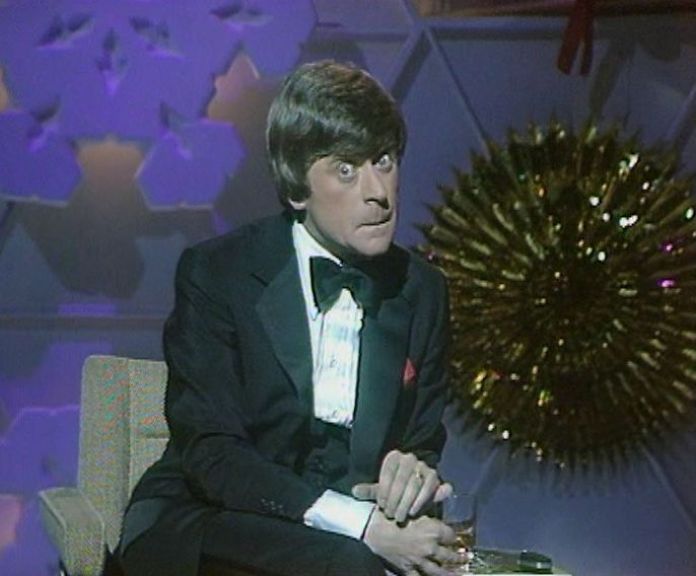For the seasoned M&W watcher, the 1982 Christmas special contains an awful lot of recycled material. Quite why Eric & Ernie revisited so many of their old routines during their last few years together is a little bit of a mystery. Several possibilities have been advanced – maybe Eddie Braben was running out of ideas or it might have been that Morecambe & Wise (especially following Eric’s second heart attack) were less confident with fresh material and so preferred to work with scripts that they knew should guarantee them laughs.
The show opens with a bombshell – Eric announces that they are retiring. Given that they were approaching the end of their career, there’s something slightly uncomfortable about this. Although at this point it does seem more like a gag rather than a coded statement – it was during 1983 that Eric began to have serious doubts about continuing and began to look forward to a peaceful retirement as a writer.
During the show, Eric phones up a number of potential guests – Denis Healey, Glenda Jackson, Andre Previn, Jimmy Young, Diana Dors – all of whom he manages to insult (causing them to slam down the phone and shake their heads). This was another old BBC favourite of course, although back in the BBC days they did manage to wangle some very big names (like Laurence Olivier). Today’s crop are perfectly fine, but (due to the fact that many already had an association with Eric & Ernie) their brief appearances don’t quite have the same impact.
Today’s sole musical guests are Wall Street Crash. They may be forgotten today (despite a lengthy career – albeit with numerous personnel changes – between 1980 and 2007) but their style of music chimed exactly with Eric and Ernie, who joins them in white top hats and tails for an entertaining musical item. This, like the rest of the show, features some familiar material (such as the reveal that Eric’s piano prowess is due to him having an impossible number of fingers on each hand).
A video shop sketch (with Valerie Minifie once again acting as a mostly silent stooge) is followed by a fairly lengthy piece (just over seven minutes) featuring Richard Vernon interviewing a pair of explorers – Eric & Ernie of course. Like Tommy Cooper, Eric seemed to adore props and gadgets and several are wheeled out here for a laugh. Vernon’s a good straight man, but possibly the problem is that he’s a little too straight, meaning that the sketch never really catches fire.
The best sketch of the evening takes place inside a lingerie store, where Little Ern (attempting to buy a bra for his sister) has to overcome his embarrassment with the lady behind the counter (played by Patricia Brake). Eric, of course, offers him his usual wholehearted support ….
A familiar sketch from the BBC era (show 4.3) it sticks very closely to the original. The one change is that Brake is made up to look dowdier than Ann Hamilton was, which means that Eric’s parting insult comes across as quite cruel.
The star guest power of today’s show doesn’t seem quite as great as, say, the 1981 special. Robert Hardy is wheeled on for another appearance – his front curtain banter with Eric & Ernie has all been road-tested before (the banana part with Sir John Mills, for example).
When you have every existing show to hand, this sort of thing can be a problem, but back in 1982 (when they were reusing gags from the previous decade that may not have been seen since their original broadcasts) it mattered less. After all, one of their most famous routines – with Andre Previn in 1971 – was a rehash of a sketch from their 1960’s days at ATV.
I enjoyed the Chattanooga Choo Choo skit, with M&W playing multiple characters. This leads into the play – set in the Yukon during the goldrush. The introductory text places us firmly in the early 1980’s (mentioning both British Leyland and Freddie Laker). Rula Lenska vamps it up very agreeably – a pity that she didn’t get a front curtain introduction before the play, but since this special only runs for fifty minutes (unlike some of the BBC specials which lasted over an hour) time was obviously a little tight.
So there we are. Taken in isolation, this is a perfectly enjoyable fifty minutes, although for me it’s impossible not to keep mentally referring to the original performances and comparing and contrasting. Mind you, if musicians can perform sets of their greatest hits, there should be no reason why comedians can’t do so as well …
























































